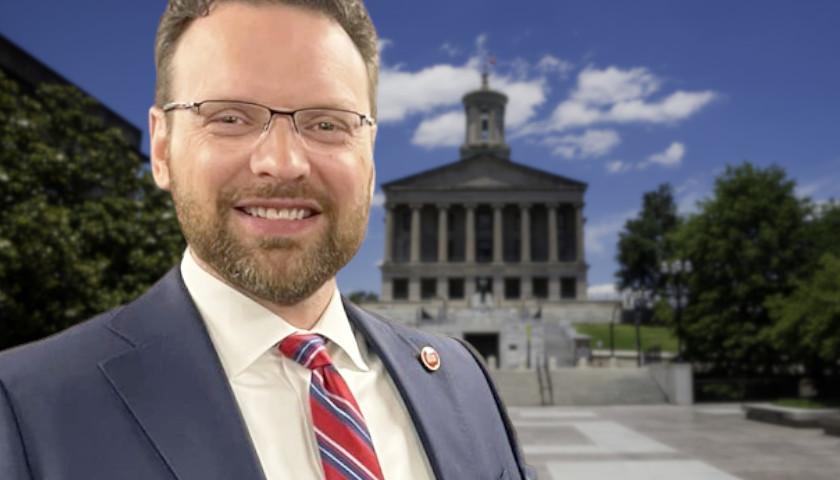Tennessee State Representative Jason Zachary (R-Knoxville) suggested his bill that strengthened the state’s duty to report law may have prevented the Covenant School shooting on March 27, 2023, in Nashville if implemented before the shooting took place.
Over the weekend, The Tennessee Star reported it was provided the name of the psychologist who was reportedly part of the care team for Covenant School killer Audrey Elizabeth Hale.
That psychologist allegedly failed in her professional and legal duty to warn law enforcement after Hale purportedly expressed fantasies about murdering her family members and carrying out a school shooting while under treatment.
Sources additionally told The Star that a search warrant was served and executed on the psychologist’s Nashville office in July 2023 and that documents obtained during that search are the basis for the claim that Hale told the psychologist during her treatment sessions that she fantasized about killing her parents and further fantasized about a school shooting.
While there was a duty to report law at the time of the shooting, Zachary (pictured above), whose bill, HB 1625, went into effect upon the governor’s approval earlier this year on April 23, said the statutes at the time of the shooting were “super vague and super short.”
“After the tragedy at Covenant, I had a friend reach out to me who lives in Nashville, whose children went to the Covenant School…He worked in the Haslam administration. He’s an attorney. His wife worked in the Haslam administration and she’s an attorney. So I already knew them and had a good relationship with them. They reached out and asked if they could come to Knoxville to talk about something that they had discovered, and so we met at Panera on Cedar Bluff in Knoxville and they literally laid out duty to warn, duty to report, and it requires a mental health practitioner to report If somebody makes a threat against a clearly identified victim. But then it stops. it’s super vague, super short,” Zachary explained on Monday’s edition of The Michael Patrick Leahy Show.
“They brought to me language, literally brought to me language and said, ‘We think we can help you with this, strengthen this.’…We feel like the mental health practitioner knew what this perpetrator was going to do and they didn’t report it. It turns out that it looks like they could be right. So they brought language that strengthened it by taking it a step further and saying that if there is an imminent threat or there is an intent, then you have to report that to law enforcement,” Zachary added.
That wasn’t in the current statute, so we added that to make it really clear, you have to call law enforcement. Then the second part is if it’s more of a general threat, that mental health practitioners, using their reasonable care and medical judgment, must determine that the patient has the ability to carry it out. Then they have to call 988, which is a mental health crisis hotline, or call your local emergency agency and report that this person could have the ability to carry a threat out and they need additional assessment. So how it was written was so vague, it didn’t tell a mental health practitioner what they needed to do,” he continued.
Zachary went on to note that mental health professionals are typically the “first line of defense” as they work with mentally unstable individuals, stressing how critical it is for professionals to report an “identified threat.”
“Many times our colleagues on the left want to just treat symptoms. They want to run around yelling, ‘Gun control,’ screaming, doing all these things that don’t address core issues…So we, as House Republicans, we got together and talked about how to address core issues. This is one way we address core issues by strengthening the requirements from mental health practitioners, who are typically the first line of defense – talking to mentally unhealthy, mentally unstable people. That person has to say something when they see something. We tell that to kids all the time and we’re telling it now to our mental health practitioners. This is in law, if somebody comes to you, not only with a clear identified threat but a general threat, you have to report that, get a second opinion, additional evaluation, so that way we can stop some of this evil that’s being perpetrated,” Zachary said.
Zachary further said that the psychologist who reportedly failed to report threats made by Hale may be held civilly liable if the reports are proven true.
“If the reports are correct, what you talked about with the raid, with this bill in effect, that mental health practitioner, by law, has to report that. That mental health practitioner, my guess is, once this comes out and once you’re able to quantify what these allegations are, that means that they’re going to be civilly liable, in my opinion, for something that they did not report,” Zachary said.
Regarding additional consequences for professionals who do not report threats made by their clients, Zachary said his bill included revoking licenses for professionals who fail to report.
“This is about making sure we stop mentally unhealthy people from committing terrible acts. If you look at the very end of the legislation that’s drafted, it says they do have civil immunity, but we also put in there that their license is protected if they report. If they don’t report it, man, their license is on the line. They should have their license revoked if they do not report something that is an imminent, clear threat and the person has an intent and ability to carry it out,” Zachary said.
– – –
Kaitlin Housler is a reporter at The Tennessee Star and The Star News Network. Follow Kaitlin on X / Twitter.
Photo “Jason Zachary” by Jason Zachary.





